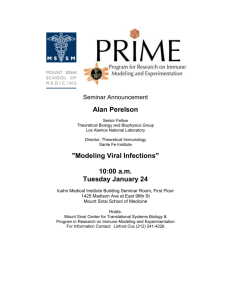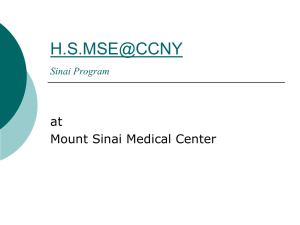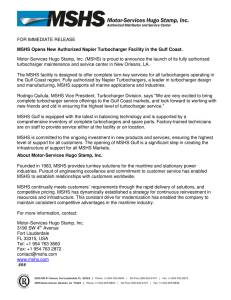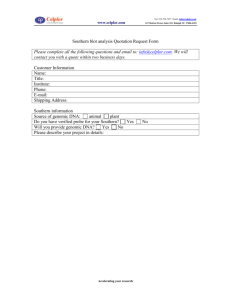ABSTRACT: 2015 ELAM Institutional Action Project Poster Symposium
advertisement
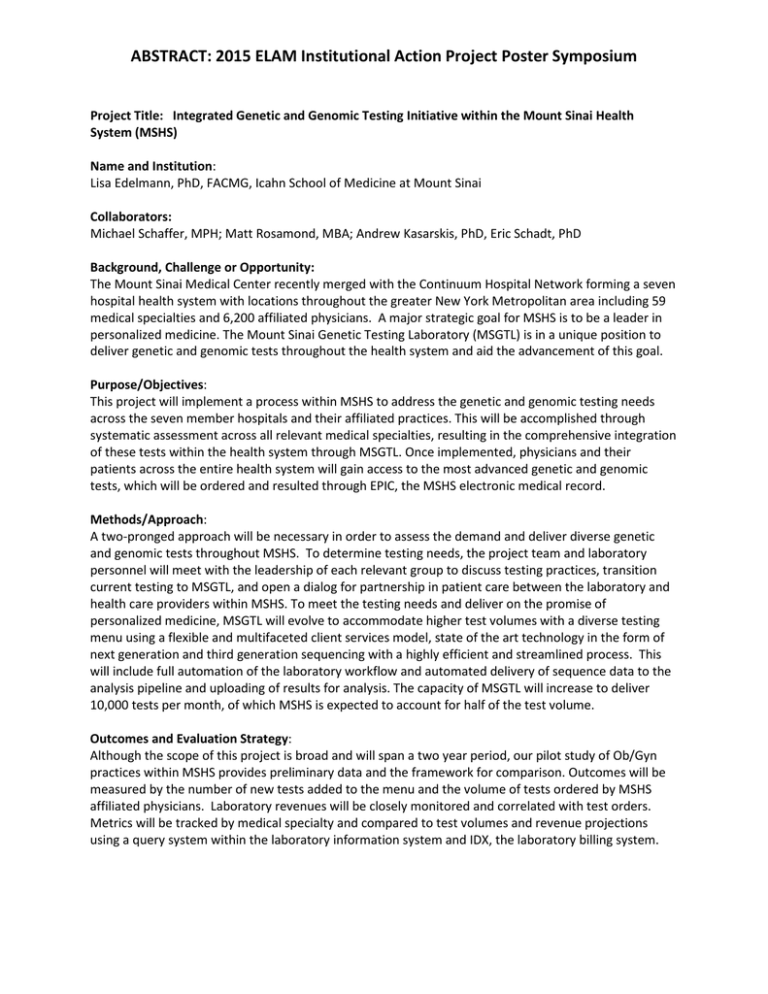
ABSTRACT: 2015 ELAM Institutional Action Project Poster Symposium Project Title: Integrated Genetic and Genomic Testing Initiative within the Mount Sinai Health System (MSHS) Name and Institution: Lisa Edelmann, PhD, FACMG, Icahn School of Medicine at Mount Sinai Collaborators: Michael Schaffer, MPH; Matt Rosamond, MBA; Andrew Kasarskis, PhD, Eric Schadt, PhD Background, Challenge or Opportunity: The Mount Sinai Medical Center recently merged with the Continuum Hospital Network forming a seven hospital health system with locations throughout the greater New York Metropolitan area including 59 medical specialties and 6,200 affiliated physicians. A major strategic goal for MSHS is to be a leader in personalized medicine. The Mount Sinai Genetic Testing Laboratory (MSGTL) is in a unique position to deliver genetic and genomic tests throughout the health system and aid the advancement of this goal. Purpose/Objectives: This project will implement a process within MSHS to address the genetic and genomic testing needs across the seven member hospitals and their affiliated practices. This will be accomplished through systematic assessment across all relevant medical specialties, resulting in the comprehensive integration of these tests within the health system through MSGTL. Once implemented, physicians and their patients across the entire health system will gain access to the most advanced genetic and genomic tests, which will be ordered and resulted through EPIC, the MSHS electronic medical record. Methods/Approach: A two-pronged approach will be necessary in order to assess the demand and deliver diverse genetic and genomic tests throughout MSHS. To determine testing needs, the project team and laboratory personnel will meet with the leadership of each relevant group to discuss testing practices, transition current testing to MSGTL, and open a dialog for partnership in patient care between the laboratory and health care providers within MSHS. To meet the testing needs and deliver on the promise of personalized medicine, MSGTL will evolve to accommodate higher test volumes with a diverse testing menu using a flexible and multifaceted client services model, state of the art technology in the form of next generation and third generation sequencing with a highly efficient and streamlined process. This will include full automation of the laboratory workflow and automated delivery of sequence data to the analysis pipeline and uploading of results for analysis. The capacity of MSGTL will increase to deliver 10,000 tests per month, of which MSHS is expected to account for half of the test volume. Outcomes and Evaluation Strategy: Although the scope of this project is broad and will span a two year period, our pilot study of Ob/Gyn practices within MSHS provides preliminary data and the framework for comparison. Outcomes will be measured by the number of new tests added to the menu and the volume of tests ordered by MSHS affiliated physicians. Laboratory revenues will be closely monitored and correlated with test orders. Metrics will be tracked by medical specialty and compared to test volumes and revenue projections using a query system within the laboratory information system and IDX, the laboratory billing system. Integrated Genetic and Genomic Testing Initiative within the Mount Sinai Health System (MSHS) Lisa Edelmann, PhD, FACMG, Icahn School of Medicine at Mount Sinai Collaborators: Michael Schaffer, MPH; Matt Rosamond, CFA; Andrew Kasarskis, PhD, Eric Schadt, PhD BACKGROUND/OPPORTUNITY Mount Sinai Health System Hospital Campuses Mount Sinai Beth Israel The Mount Sinai Medical Center recently merged with the Continuum Hospital Network forming a seven hospital health system. The Icahn School of Medicine is the graduate degree granting institution and sets the academic and scientific goals for the health system. With this merger, the Health system includes 59 medical specialties and 6,200 affiliated physicians making it one of the largest health systems in the country. A major strategic goal for MSHS is to be a leader in personalized medicine. The Mount Sinai Genetic Testing Laboratory (MGTL) is in a unique position to deliver genetic and genomic tests throughout the health system and aid the advancement of this goal. t Beth Israel Beth Israel Brooklyn St. Lukes Mount Sinai Queens Roosevelt Mount Sinai Hospital NY Eye and Ear Icahn School of Medicine Faculty Practice The hospitals of MSHS are located throughout Manhattan, Brooklyn and Queens with additional affiliate hospitals that span the greater New York area. T Test Ordering and Resulting through EPIC for MGTL For Next Generation Sequencing (NGS) tests, the Genomics Core Facility generates sequence data which is returned to the laboratory through a super computer (Minerva). Mount Sinai Health System EMR (EPIC) Test orders Test results Genomics Core Facility Patient Samples NGS Tests Genetic Testing Laboratory a. Determine current ordering practices b. Education regarding state of the art testing c. New test development based on need d. Determining the payor mix and reimbursement expected for each test 2. MGTL will evolve to accommodate higher test volumes with a diverse testing menu using a flexible and multifaceted client services model and state of the art technology. a. Automation of workflow and data pipeline b. Superpanel development to accommodate multiple tests from a single library. c. Complex reference network to accommodate testing needs not met by MGTL Implement a process within MSHS to address the genetic and genomic testing needs across the seven member hospitals and their affiliated practices. Revenues from testing will be directed back to the medical school and the hospitals will reduce costs for send outs to outside laboratories. 1. Meet with the leadership of each relevant group within MSHS to discuss testing practices, transition current testing to MGTL. High test volume specialties a. Obstetrics and Gynecology Variant Data b. Pediatrics / Genetics c. Neurology High-Performance d. Cardiology Computing e. Ophthalmology MGTL Automated Workflow for Next Generation Sequencing Tests f. Endocrinology The MGTL NGS workflow has been converted to full automation to g. Psychiatry accommodate high-throughput and rapid turn around times. Open a dialog for partnership in patient care between the laboratory and healthcare providers within MSHS. PURPOSE/OBJECTIVES Physicians and their patients across the entire health system will gain access to the most advanced genetic and genomic tests, which will be ordered and resulted through EPIC, the MSHS electronic medical record. A two-pronged approach will be necessary in order to assess the demand and deliver diverse genetic and genomic tests throughout MSHS. Primary Sequence Data Infirmary Systematic assessment across all relevant medical specialties, resulting in the comprehensive integration of these tests within the health system through MGTL. OUTCOMES/EVALUATION METHODS/APPROACH Outcome Measurements Number of new tests added (tracked by laboratory directors and project managers) Volume of tests ordered by medical specialty (tracked by laboratory LIMS) Monthly revenues/collections (tracked by billing department through IDX) Number of new physician clients/practices onboarded (tracked by Salesforce software) Insurance payor mix (tracked by billing department through IDX) Pilot Study of Obstetrics and Gynecology Practices in MSHS Ob/Gyn practices were onboarded over a one year period from 10/13 through 10/14 17 New OB/GYN, MFM, IVF practices with 40 physicians/C.N.M./Genetic Counselors Revenue growth of ~ 100% (Shown in bar graph below) 000$s 25000 The Mount Sinai Genetic Testing Laboratory (MGTL) is a CLIA certified, CAP accredited laboratory within the clinical arm of the Department of Genetics and Cyto Genomic Sciences. The laboratory has three divisions, Molecular Molecular Genetics, Cytogenetics and Cytogenomics Biochem and Biochemical Genetics. MGTL is also ABMGG accredited in the three laboratory specialties. It currently employs a staff of over 90 people including 12 licensed clinical laboratory directors. 20000 15000 10000 5000 0 2013 2014 2015 DISCUSSION This is a broad project that will span a two year period; however progress has already been made in several key areas. Since January of 2015, MGTL has converted the molecular division to fully automated workflow with additional scaling of equipment and automation in the Biochemical and Cytogenomics divisions. An integrated web based interface has been built to accommodate automated data flow. The projected test volumes for MGTL will be 10,000/month by the end of 2015. Three Tiered Approach for the Expansion of the NGS NGS testing will be expanded to include carrier screening, non invasive prenatal testing (NIPT), a large number of disease-specific panels. Whole exome and genome tests will be provided throughout the MSHS. Staff and Faculty recruitment are ongoing to accommodate volume increases. Disease Specific Panels Carrier Screening • Bioinformatics Infrastructure • Automated pipeline • Parallel high-throughput analysis • Import of complex genomic results to LIMS • Customized semi-automated report generation • Automated library preparation • Rapid/High-throughput sequencing NIPT • Bioinformatics Infrastructure • Automated pipeline • Parallel high-throughput analysis • Chromosome counting and normalization • Automated sample preparation • Rapid/High-throughput sequencing Exome/Genome Sequencing • Bioinformatics Infrastructure • Automated pipeline • Customizable analysis • Variant analysis interface • Automated library preparation • Rapid/High-throughput sequencing SUMMARY/CONCLUSIONS The promise of personalized medicine includes the determination of the genetic and/or genomic causes of disease. In order to deliver these tests to all patients across the MSHS, MGTL must prepare to accommodate the majority of these samples by offering a very broad menu of clinical sequencing tests through the Genomics Core Facility and report results back through the patient EMR. Keeping pace with new technological advances as well as navigating the changing regulatory and reimbursement landscapes are necessary for success in delivering genetic/genomic medicine. “Presented at the 2015 ELAM® Leaders Forum”
